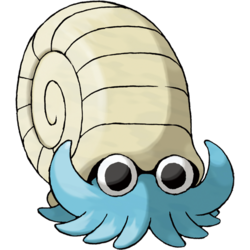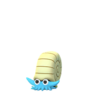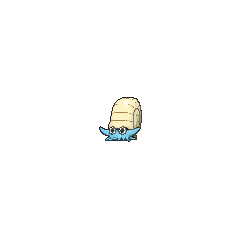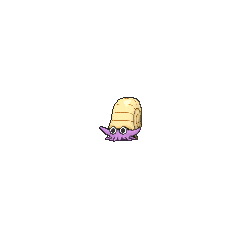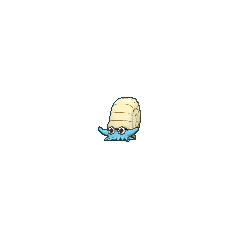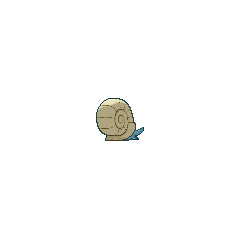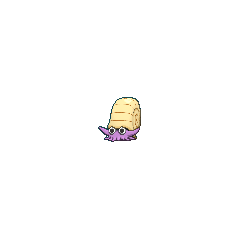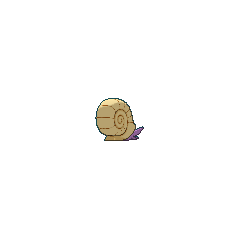From Bulbapedia, the community-driven Pokémon encyclopedia.
Omanyte (Japanese: オムナイト Omnite) is a dual-type Rock/Water Fossil Pokémon introduced in Generation I.
It is resurrected from a Helix Fossil and evolves into Omastar starting at level 40.
Biology
Omanyte is a small Pokémon similar to an ammonite. It has a sky blue body with ten tentacles and a pale yellow, helix-spiraled shell on its back. The shell's rim has two circular indents where Omanyte's large saucer-like eyes protrude. If attacked or threatened, it quickly withdraws into its hard shell.
Omanyte is considered extinct, although it can be revived from Fossils. Its fossils have been excavated in areas that were once oceans long ago. Omanyte regulated its buoyancy by storing and releasing air within its shell and controlled direction by twisting its tentacles. While Omanyte fed on plankton, it was preyed on by Archeops and Carracosta.
In the anime
Major appearances
Two Omanyte debuted in Attack of the Prehistoric Pokémon, where Ash encountered them along with all of the other Generation I Fossil Pokémon. A dynamite blast woke up the Fossil Pokémon living deep beneath Grampa Canyon. They chased Ash and Team Rocket around until an Aerodactyl showed up and scared them off.
Multiple Omanyte and their evolved form, Omastar, appeared in Fossil Fools. They were discovered to be living in the Ruins of Alph and moved to a museum.
An Omanyte appeared in Dealing With Defensive Types! in the Canalave Gym. It caught Team Rocket trying to steal food from the Gym kitchen whilst Ash was having his Gym battle with Byron, and attacked them with Water Gun, sending them blasting off.
Minor appearances
An Omanyte appeared as an image in the dubbed version of The Ultimate Test.
An Omanyte appeared in the Japanese credits of Pikachu's Rescue Adventure.
An Omanyte appeared in a fantasy in A Ruin with a View.
An Omanyte appeared in A Gruff Act to Follow!, where it was revived from a Fossil. It reappeared in the next episode, where it was seen along with several other Pokémon within the habitat created for the revived Fossil Pokémon.
Three Omanyte appeared in Lucario and the Mystery of Mew as some of the Pokémon living in the Tree of Beginning. One also appeared in the opening sequence of the movie.
A Mirage Omanyte appeared in a flashback in The Mastermind of Mirage Pokémon.
An Omanyte appeared in SS002, where it was seen underwater outside Vermilion City.
Pokédex entries
| Episode
|
Pokémon
|
Source
|
Entry
|
| EP046
|
Omanyte, Omastar, Kabuto, and Kabutops
|
Ash's Pokédex
|
Omanyte and Omastar, Kabuto and Kabutops. It is believed these Pokémon became extinct tens of thousands of years ago. The details of their behavior is shrouded in mystery. Though some have speculated that they may still exist, none of these Pokémon have ever been seen alive.
|
|
| Episode
|
Pokémon
|
Source
|
Entry
|
| EP163
|
Omanyte
|
Ash's Pokédex
|
Omanyte, the Spiral Pokémon. Believed to have lived over 2 billion years ago, recent research indicates that it was able to control its buoyancy by storing and releasing air in its shell.
|
|
In the manga
In the Pokémon Adventures manga
- Main article: Omny
Misty had an Omanyte, which she gave to Yellow in As Gastly as Before. He is then nicknamed Omny. He evolves into Omastar in The Might of...Metapod?!.
An Omanyte caught by Crystal and lent to Emerald for his Battle Pike challenge appeared in Moving Past Milotic.
In the Pokémon Pocket Monsters manga
Green's Omanyte debuted in The Big Battle In The Viridian Forest!!.
In the TCG
- Main article: Omanyte (TCG)
Game data
Pokédex entries
| Generation I
|
|
|
Kanto
#138
|
| Red(ENG)
|
Although long extinct, in rare cases, it can be genetically resurrected from fossils.
|
| Blue
|
| Yellow
|
An ancient Pokémon that was recovered from a fossil. It swims by cleverly twisting its 10 tentacles about.
|
| Stadium
|
A prehistoric and long-extinct Pokémon that was resurrected from a fossil. Swims by twisting its 10 tentacles about.
|
|
|
| Generation II
|
|
|
Johto
#220
|
| Gold
|
Revived from an ancient fossil, this Pokémon uses air stored in its shell to sink and rise in water.
|
| Silver
|
This Pokémon from ancient times is said to have navigated the sea by adeptly twisting its 10 tentacles.
|
| Crystal
|
In prehistoric times, it swam on the sea floor, eating plankton. Its fossils are sometimes found.
|
| Stadium 2
|
Revived from an ancient fossil, this Pokémon uses air stored in its shell to sink and rise in water.
|
|
|
| Generation III
|
|
Hoenn
#—
|
|
Kanto
#138
|
| Ruby
|
Omanyte is one of the ancient and long-since-extinct Pokémon that have been regenerated from fossils by people. If attacked by an enemy, it withdraws itself inside its hard shell.
|
| Sapphire
|
| Emerald
|
One of the ancient and long-since-extinct Pokémon that have been regenerated from fossils by humans. If attacked, it withdraws into its hard shell.
|
| FireRed
|
A prehistoric Pokémon that lived in the primordial sea, it swims by twisting its 10 tentacles about.
|
| LeafGreen
|
Although long extinct, in rare cases, it can be genetically resurrected from fossils.
|
|
|
| Generation IV
|
|
Sinnoh
#—
|
|
Johto
#225
|
| Diamond
|
A Pokémon that was resurrected from a fossil using modern science. It swam in ancient seas.
|
| Pearl
|
| Platinum
|
| HeartGold
|
Revived from an ancient fossil, this Pokémon uses air stored in its shell to sink and rise in water.
|
| SoulSilver
|
This Pokémon from ancient times is said to have navigated the sea by adeptly twisting its 10 tentacles.
|
|
|
| Generation V
|
|
|
Unova
#—
|
| Black
|
A Pokémon that was resurrected from a fossil using modern science. It swam in ancient seas.
|
| White
|
| Black 2
|
A Pokémon that was resurrected from a fossil using modern science. It swam in ancient seas.
|
| White 2
|
|
|
| Generation VI
|
|
Kalos
#—
|
|
Hoenn
#—
|
| X
|
A prehistoric Pokémon that lived in the primordial sea, it swims by twisting its 10 tentacles about.
|
| Y
|
Revived from an ancient fossil, this Pokémon uses air stored in its shell to sink and rise in water.
|
| Omega Ruby
|
Omanyte is one of the ancient and long-since-extinct Pokémon that have been regenerated from fossils by people. If attacked by an enemy, it withdraws itself inside its hard shell.
|
| Alpha Sapphire
|
|
|
| Generation VII
|
|
Alola
USUM: #227
|
|
Kanto
#138
|
| This Pokémon has no Pokédex entries in Sun and Moon.
|
| Ultra Sun
|
Omanyte lived in the seas of antiquity. Its fossils have been found bearing bite marks from Archeops, so apparently Archeops preyed on it.
|
| Ultra Moon
|
It was restored from an ancient fossil. Those Helix Fossils are excavated from areas that were once oceans long, long ago.
|
| Let's Go Pikachu
|
An ancient Pokémon that was recovered from a fossil. It swam by cleverly twisting its 10 tentacles about.
|
| Let's Go Eevee
|
|
|
|
|
Game locations
In side games
|
|
| Generation II
|
|
| This Pokémon is unavailable in Generation II side games.
|
|
|
|
|
|
|
|
|
|
|
In events
In-game events
Held items
Stats
Base stats
| Stat
|
Range
|
| At Lv. 50
|
At Lv. 100
|
35
|
|
95 - 142
|
180 - 274
|
40
|
|
40 - 101
|
76 - 196
|
100
|
|
94 - 167
|
184 - 328
|
90
|
|
85 - 156
|
166 - 306
|
55
|
|
54 - 117
|
103 - 229
|
35
|
|
36 - 95
|
67 - 185
|
Total: 355
|
Other Pokémon with this total
|
- Minimum stats are calculated with 0 EVs, IVs of 0, and (if applicable) a hindering nature.
- Maximum stats are calculated with 252 EVs, IVs of 31, and (if applicable) a helpful nature.
- This Pokémon's Special base stat in Generation I was 90.
|
Pokéathlon stats
Type effectiveness
| Under normal battle conditions in Generation IX, this Pokémon is:
|
|
|
|
|
|
|
|
|
|
|
|
|
Learnset
|
|
|
|
- Bold indicates a move that gets STAB when used by Omanyte
- Italic indicates a move that gets STAB only when used by an Evolution of Omanyte
- Click on the generation numbers at the top to see level-up moves from other generations
|
|
|
|
|
- Bold indicates a move that gets STAB when used by Omanyte
- Italic indicates a move that gets STAB only when used by an Evolution of Omanyte
- Click on the generation numbers at the top to see TM moves from other generations
|
|
|
|
|
- Bold indicates a move that gets STAB when used by Omanyte
- Italic indicates a move that gets STAB only when used by an Evolution of Omanyte
- Click on the generation numbers at the top to see level-up moves from other generations
|
|
|
|
|
- Bold indicates a move that gets STAB when used by Omanyte
- Italic indicates a move that gets STAB only when used by an Evolution of Omanyte
- Click on the generation numbers at the top to see TM moves from other generations
|
|
|
|
|
- Moves marked with an asterisk (*) must be chain bred onto Omanyte in Generation VII
- Moves marked with a double dagger (‡) can only be bred from a Pokémon who learned the move in an earlier generation.
- Moves marked with a superscript game abbreviation can only be bred onto Omanyte in that game.
- Bold indicates a move that gets STAB when used by Omanyte
- Italic indicates a move that gets STAB only when used by an Evolution of Omanyte
- Click on the generation numbers at the top to see Egg moves from other generations
|
|
|
|
|
- A black or white abbreviation in a colored box indicates that Omanyte can be tutored the move in that game
- A colored abbreviation in a white box indicates that Omanyte cannot be tutored the move in that game
- Bold indicates a move that gets STAB when used by Omanyte
- Italic indicates a move that gets STAB only when used by an Evolution of Omanyte
- Click on the generation numbers at the top to see Move Tutor moves from other generations
|
Side game data
Evolution
Sprites
Trivia
- In the Pokémon Red and Blue beta, Omanyte was originally known as "Ess". This is derived from the beginning of the word "escargot", which is French for snail.
Origin
Omanyte is based on the ammonite.
Name origin
Omanyte is a phonetic anagram of ammonite, the creature on which it is based.
Omnite is a combination of オウムガイ ōmugai (nautilus) and ammonite.
In other languages
|
|
| More languages
|
 Hindi Hindi
|
ओमानाइट Omanyte
|
Same as English name
|
 Russian Russian
|
Оманайт Omanayt
|
Transcription of English name
|
|
|
|
Related articles
External links

|
This Pokémon article is part of Project Pokédex, a Bulbapedia project that aims to write comprehensive articles on each Pokémon species, as well as Pokémon groups and forms.
|

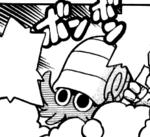
 For other sprites and images, please see Omanyte images on the Bulbagarden Archives.
For other sprites and images, please see Omanyte images on the Bulbagarden Archives.
